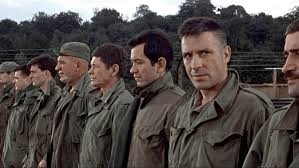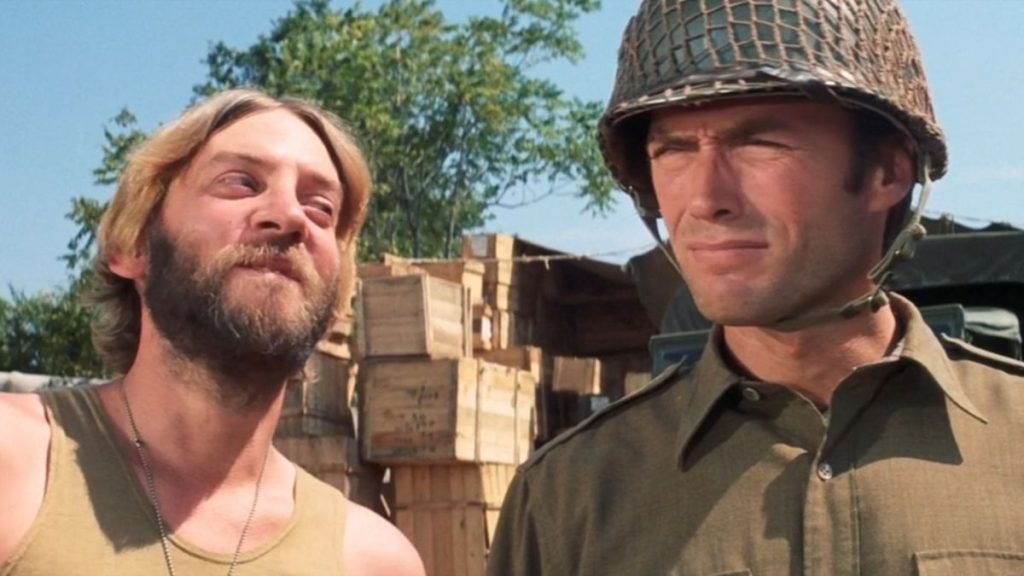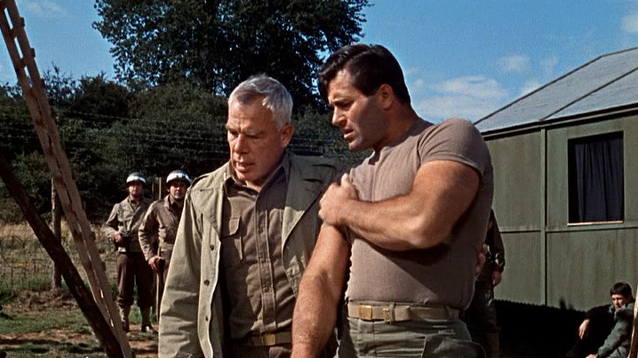
On balance, any serious examination of World War Two would have to conclude the Nazis were a tad uncouth, disagreeable even. And yet without their naughty goose-stepping antics across Germany and the rest of Europe, moviedom would be immeasurably poorer. So sure, sixty-odd million people lost their lives during humanity’s worst ever quarrel, but the result was we ended up with some fucking great flicks. Hey, I can live with that.
Still, there’s a growing problem with modern war movies in that they’re so bloody grim. There are just far too many limbs getting blown off, lingering deaths, wailing civilians, rat-infested trenches, bouts of terror-induced vomiting and dreary depictions of post-traumatic shock. Now where’s the fun in that?
All these super-earnest movies essentially do is bang us over the head with the age-old message war is hell. Well, excuse me, I already know that. I mean, who goes into a war flick undecided on whether major armed conflict between countries is a good or bad thing? Can’t we just take it as a given that it’s a bummer, especially if you’re stuck somewhere dead gloomy like the Warsaw Ghetto?
Hence, I’ve come to develop a soft spot for filmmakers who present war as an adventure. You know, a bit of a romp. Sure, people still get their heads blown off but not depressingly so. You don’t start clawing at your eyes halfway through, wishing you’d opted for another laugh at the Blue Oyster Bar’s silly dancing gays instead. So let’s hear it for three combat classics that are so engaging I almost wish someone would invade Poland all over again.

The Eagle Has Landed (1976)
Based on Jack Higgins’ runaway bestseller, this John Sturges flick pretty much gets everything right. Decent production values, a top-notch international cast that meshes well, confident direction, excellent pacing, a nice streak of humor and an exciting, satisfying finale. The English countryside, complete with idyllic greenery, churchyards and waterwheels, has also never looked lovelier, making you realize England would be a perfectly acceptable place to live if it didn’t rain there every two and a half hours.
Back to that cast.
Michael Caine plays Kurt Steiner, the head of a crack paratrooper unit. He’s been tasked with the slightly tricky mission of abducting Churchill and dragging him back to Germany for Hitler to presumably tie to a chair, dance round and fart in his face. Eagle is notable for its incredibly positive portrayal of Krauts. Steiner and his devoted buddies are disciplined, principled, morally upright and unrelentingly brave. One minute they’re trying to save Jew scum in occupied Poland from the beastly SS, the next they’re preventing a hapless child from getting swept to a watery doom. These guys really would help little old ladies across the road rather than rape them at knifepoint. And not once do they question how the hell Michael Caine got cast as a German.
Saying that, most of the characters’ accents are all over the place. Robert Duvall as Steiner’s one-eyed boss nails it, but the normally reliable Donald Pleasence puts in such an intentionally minimalist performance as Himmler that he can neither find the energy to attempt any vocal authenticity nor even bother to stand up for most of the movie.
His vague inertia though is counterbalanced by a pre-Dallas Larry Hagman playing the gung-ho but combat-untested colonel of a nearby US Army Rangers base. Hagman gets entangled in the daring kidnap plan, seeing it as the perfect chance to finally prove his mettle. He enjoys plenty of macho bluster, even railing at a hesitant (but more competent) deputy that he’ll swing him by the balls from Big Ben. Hagman is a constant delight here, rewarded with a memorable death scene in which he is not only shot by a civilian but a woman to boot.
Eagle just clicks from start to finish and whenever I watch it I’m certain (while attempting a soft Irish accent) I have known the days.

Kelly’s Heroes (1970)
Starting on a rain-lashed night in 1944, this knockabout gem sees Private Kelly (Clint Eastwood) leading a fantastic ensemble cast deep into occupied France to steal $14million worth of gold bullion from a heavily guarded bank. After capturing a German colonel during a reconnaissance mission, Kelly eventually finds a poorly disguised gold ingot in his bag. He pours a bottle of brandy down the guy’s throat to find out more, quickly deciding to steal the rest of the loot during a three-day leave.
And with that simple setup we’re off and running through a pockmarked country full of bomb craters, ruined buildings and totally corrupt US servicemen.
But of course when you’re harboring such an audacious plan, it’s pretty hard to keep the cat in the bag. Before long Kelly’s picked up a whole load of interested parties, including a pre-Seinfeld Uncle Leo (being just as obnoxious), a tough as nails Telly Savalas, and the glorious Oddball. Oddball, played by a bearded Donald Sutherland in a brown leather jacket, is a spaced-out, hippy-like tank commander and probably one of the most memorable characters you’ll ever encounter in a WW2 movie. When he’s not warning moaners about their ‘negative waves’, he’s drinking wine, eating cheese and catching some rays or heading off into battle with his beloved Shermans blaring music (a signature move you suspect Coppola took note of).
Troy Kennedy Martin (hot off penning the much-loved Italian Job) deserves much credit for coming up with such a superbly imaginative and inventive script. It’s just a joy all the way, especially its climactic battle that features snipers in bell towers, Tiger tanks getting their gun turrets stuck, a blonde, scar-faced Nazi sergeant, and even a pastiche of The Good, The Bad and The Ugly.
Amazingly the daring heist, which one character refers to as the ‘perfect crime’, appears to be based on some sort of truth.

The Dirty Dozen (1967)
The oldest of my fun war movies and arguably the best known, this Robert Aldrich effort is built upon a diamond idea. Twelve cons, many of whom are set for a date with the hangman, get the chance to redeem themselves by being dropped behind enemy lines to kill as many German top brass relaxing at a swanky chateau as possible. There’s just one snag: it’s essentially a suicide mission.
A perfectly cast Lee Marvin is ordered to whip this ragtag bunch of losers into shape under heavy secrecy. “I don’t like it,” he growls at his bosses. “I think it stinks.”
Before long he’s grudgingly sent to their military prison, meeting all of them in a classic courtyard scene. They range from the good-natured giant Clint Walker and the simple-minded Donald Sutherland to the authority-baiting troublemaker John Cassavetes and the unhinged sex-killer Telly Savalas (whose misogyny, religious mania and racism are among his more personable attributes).
Aldrich keeps things bubbling along nicely, although Marvin’s run-in with an interfering colonel and subsequent war games could have been trimmed. Anyhow it all builds to a tense, well-staged finale with plenty of deaths.
Despite a handful of sequels, this cracker has surprisingly never been remade (although I shudder to think what namby-pamby actors from today would try to fill the shoes of Bronson and co).
Bonus points if you can tell me which well-known actor starred in all three of the above movies.